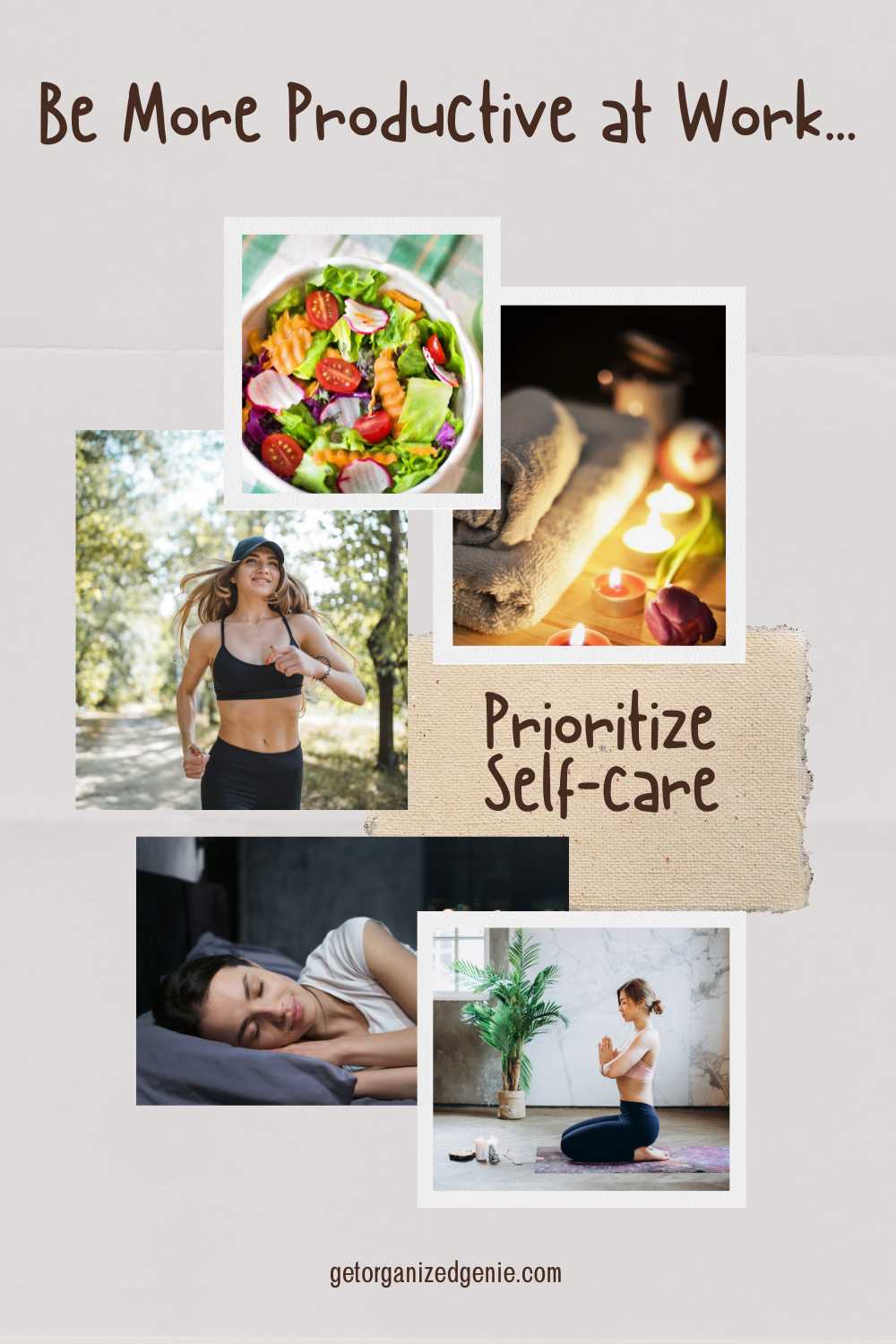- Home
- Increase Productivity at Work
How to Increase Productivity at Work
Are you looking for ways to be more
efficient and increase productivity at work? If you are, here is a great place
to start!
This article provides useful tips to help
you become more productive in the workplace, giving you more time to spend with
your family and friends…or simply to do the things that really matter!
Strategies to Increase Productivity at Work
To be more productive, we need to
draw on our mental and physical energy, as well our motivation. Optimizing the
way we use these resources is the key to increasing productivity without
becoming stressed or overwhelmed!
Although there’s no magical formula that will increase productivity at work overnight, incorporating the appropriate adjustments to your working habits and environment will help you to become more productive in the long term.
Finding the right strategy depends on the nature of your work, the goals you wish to achieve, your personality, and working style. Experiment with different techniques and use the ones that suit you best!
Read on for great tips to increase
productivity at work…
An organized workspace boosts productivity
An organized office
and desk space are essential to increase productivity at work. Knowing exactly
where your office supplies and documents are located and having them close by
saves valuable time and helps you stay focused on the tasks at hand.
Get things out of your head
To be productive, we
need a clear mind and sharp focus. Attempting to keep all of our ideas, pending tasks, and commitments in our heads causes constant distraction, drains our mental
energy, and reduces productivity.
One of the best ways to combat this is to get these thoughts out of our heads and into a trusted system. This trusted system (sometimes referred to as an external brain), consists of a set of organizational tools including note-taking devices, calendars, planners, to-do lists, and checklists.
Get into the habit of using the above-mentioned organizational tools as you work. You'll be less likely to forget things and you won't clutter your mind.
The Getting Things Done (GTD) system developed by organizational and productivity consultant David Allen(1) gives the following guidelines, which can help you to increase productivity at work:
Start by making a list of all pending tasks (Master To Do List).
Analyze each task and decide on the next action step:
- If a task will take you less than two minutes, it’s more time-effective to do it straight away instead of having to come back to it at a later date.
- If you can’t address a task straight away, decide when you will be able to do so.
- If a task doesn’t correspond to you, delegate it to the appropriate person.
- If a task is not relevant or important, cross it off the list.
Carry out a weekly review of your task list to
ensure progress is being made as planned.

Learn to Prioritize
During the working
day, we are usually confronted with a variety of different tasks, some of which
are critical to making progress, some are urgent and present themselves
unannounced, whilst others have little relevance or importance.
Learning to prioritize important tasks and focusing our efforts on getting them done is essential to increase productivity at work.
Use simple
prioritization techniques, such as the Eisenhower Decision Matrix or Eat That Frog Method to help you to prioritize your workload.
Draw on your natural energy to optimize
productivity
Have you noticed that there
are certain times of the day when your energy levels and motivation are highest
and you find it easier to focus and produce your best work? Make the most of
these blocks of time to increase productivity at work.
Use periods when your mental energy levels are highest for tasks that require deep concentration. If possible, reserve these time blocks in your calendar.
Avoid scheduling unimportant tasks and meetings during your most productive time blocks.
Carry out less demanding tasks such as
addressing emails, making phone calls, or filing during periods when your concentration
and energy levels are lower.
Manage distractions
Our world today is
filled with distractions.
We are constantly bombarded with external distractions such as phone calls, emails, notifications, and the never-ending temptation to succumb to social media.
Worry, discomfort, stress, hunger, thirst, or boredom are other factors that cause internal distraction.
Distractions and interruptions make us lose focus and negatively impact our productivity.
One of the best ways to increase productivity at work is to minimize distractions and interruptions. Find out what distracts you most and implement appropriate solutions.
Use the following tips to increase productivity at work:
External Distractions
- If possible, silence your phone.
- Switch off pop-up notifications on mobiles and desktop devices.
- If you work in a noisy office environment, close your office door or use headphones.
- Minimize use of social media during office hours.
- Remove visual clutter from your office environment.
Internal Distractions
- Create a comfortable working environment by adjusting the lighting, temperature, and ventilation as required.
- To keep hunger and thirst at bay, make sure you have water and healthy snacks close by.
- When you have distracting thoughts, get them out of your head! Note them down or address the distracting issues with the appropriate person.
- Use techniques such as meditation or breathing exercises to settle your mind when you feel distracted.
- If you get bored with a task, leave it and progress with
something else.

Take breaks
Taking regular breaks
is one of the best ways to keep our minds focused and increase productivity at
work. Although there is no predefined formula to determine how often we should
take breaks, a 5-10 minute break every hour to stretch our legs and rest our
eyes is certainly beneficial.
Take the opportunity
to go for a walk, have a coffee or chat with a colleague during this time.
Group together similar tasks
Whenever we start a
new activity, there is an associated start-up and shut down cost. It takes us time and energy to get the items
we need for a specific task, it also takes time to get our minds into gear to
achieve optimum flow.
After completing a task, we may need to spend additional time clearing up and putting things away again. This applies to most things we do in the office and at home.
To increase
productivity at work, set aside blocks of time to carry out similar tasks such as
responding to emails, making phone calls, filing, office admin, organization, and planning.
The effectiveness of multitasking is a myth
The common belief that multitasking makes
us more productive couldn’t be further from the truth!
According to Earl K. Miller, Professor of Neuroscience at the Massachusetts Institute of Technology, the human brain has a limited capacity for simultaneous thought.
Attempting to carry out more than one task at the same time slows us down, makes us more prone to mistakes, and reduces our capacity to be creative.
To increase productivity at work, avoid the temptation to multitask. Instead, prioritize your most important tasks and address them one by one. If possible, set aside a 1 or 2-hour time block to give each task your full attention before moving on to something else.
During this time silence your phone and notifications and if you are interrupted by a work colleague, let them know that you are addressing something urgent and arrange to get back to them when you’re free.

Perfectionism
is your enemy
Wanting to achieve perfection hinders
productivity. It may cause us to spend excessive amounts of time and effort to
do things. We may delay submitting a document because we don't consider
it good enough, and in some cases, we may even procrastinate and leave things
undone.
To increase productivity a work, we should determine when things are fit for purpose, they don't have to be perfect. Be aware that getting from adequate to perfect usually requires a lot of additional time and effort that is not usually compensated by the improvement that would be achieved.
Learn to evaluate the levels of quality required for tasks and documents you prepare during the working day. The amount of attention to detail will vary depending on the purpose of a document.
An internal document or email will most likely
require less attention to fine detail than a document that is to be submitted
to a client.
Get help when you need it
If you find yourself having difficulty with
a task, don’t waste valuable time trying to figure it out yourself. Ask for
help from a colleague and offer your help and support for areas of your
expertise in return.
Prioritize your health and wellbeing
A healthy diet, physical exercise, restful sleep, and the use of relaxation techniques all benefit our general health and wellbeing and can potentially improve our productivity.
Restful sleep makes it easier to concentrate and maintain sharp focus, which is essential for high productivity.
Research studies(2) have demonstrated that regular physical exercise improves learning ability, concentration, memory, and capacity for reasoning which all favor high productivity.
Physical exercise has the added benefit of reducing feelings of anxiety, which helps us to cope better with stress.
If you would like to increase productivity at work, look after yourself:
- Eat healthy foods and drink at least 8 glasses of water daily to stay hydrated.
- Incorporate physical exercise into your weekly routine. Aim to do at least three to four 30-minute sessions of aerobic exercise per week. If you don't like going to the gym or doing aerobics classes, go for brisk walks instead.
- Use meditation and relaxation techniques to keep stress at bay.
- Avoid working excessively long hours. Give yourself time to recharge your batteries so you're ready for action the next day.
Many people understand what they need to do to be more productive at work...but the real challenge is doing it consistently, especially when you’re juggling multiple responsibilities.
If you’re a small business owner struggling to follow through on productivity habits long-term, you may find this helpful: How to Stay Consistent as a Small Business Owner.
BOTTOM LINE
Being productive comes with a wealth of benefits!
It gives you more time for yourself, helps to reduce stress, and boosts your motivation and self-esteem.
If you’re aiming to increase productivity at work, start by making small changes to your daily work routine and gradually build up.
- Use a task list to give you a clear vision of your workload and prioritize the important.
- Maintain sharp focus: monotask whenever possible, manage distractions and take regular breaks to keep your mind fresh.
- Don’t be a perfectionist.
- Avoid being prideful, ask for help when you
need it...and always remember to look after yourself!
Further Reading
Check out the following articles to help you get organized and become more productive:
- Eisenhower Decision Matrix: How to be More Productive by Prioritizing the Important
- Eat That Frog Method to Stop Procrastination and Boost Productivity
- Getting Organized at Work - 4 Essential Tips for Success
- Master To Do List Template | FREE Printable and Tips to Boost Productivity
- 12 Habits of Organized People We Should All Practice
References
- Getting Things Done, the art of stress-free productivity by David Allen.
- A Neuroscientist Shares the 4 Brain-Changing Benefits
of Exercise by Dr. Wendy Suzuki.
Share this with others by clicking the icons below!





